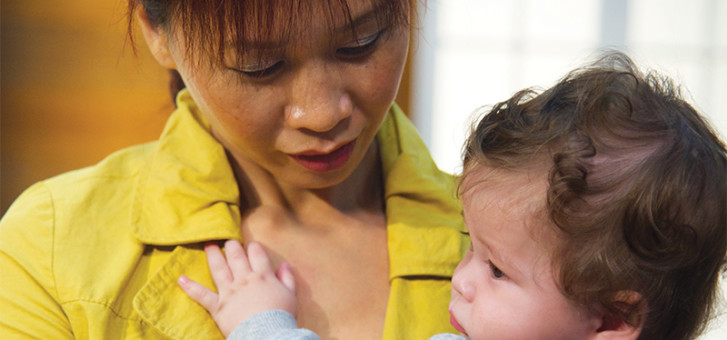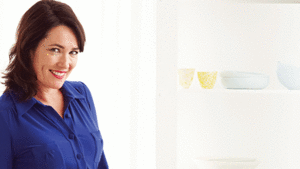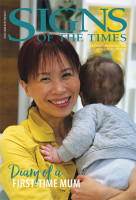T'was love at first sight. But it was also tinged with doubt, fear, and as the weeks wore on, shadowed with a bit of regret. What have I gotten myself into? Can I really do this? Why is it so hard?
My husband Daniel and I welcomed a new addition to our family about three months ago. Little Elliott not only caught us by surprise by arriving a week-and-a-half early, he was born after a rapid three-hour labour (average for first-timers is eight). The little man was in so much of a hurry, he was almost born in the hospital car park!
Nothing can fully describe the myriad of emotions I felt the moment the midwife placed the warm, slimy and rather sticky little human on my chest. There was an overwhelming feeling of relief knowing that the pain of childbirth was over, a profound sense of exhaustion from all the pushing, and an intense protective love for this tiny and bewildered-looking stranger lying on me.
Thanks to the rush of feel-good hormones that flood a woman’s body immediately after giving birth, the initial couple of mornings in hospital were a heady mix of bliss and joy. I couldn’t stop gazing adoringly at the tiny little bundle wrapped up in the bassinet next to my bed. We were both exhausted from the birth, so we spent a good amount of time sleeping. Learning how to breastfeed turned out to be pretty straightforward and my confidence soared.
Then on the second night, Elliott woke up enough to understand what it meant to be hungry. His mother, on the other hand, was still tired, with a body so sore it was as if she had just completed an intensive mountaineering expedition. She needed a good night’s rest, but that was as elusive as a newborn who could dress himself.
On that and subsequent nights, breastfeeding took up to two hours at a time, and it felt that as soon as we were finished and I was falling back to sleep that he wanted to be fed again. It also became increasingly difficult to settle Elliott back to sleep, which sometimes meant that by the time his next feed rolled along, I was still trying to settle him from his previous feed.
Luckily, because I was still in hospital, when it was too hard to handle, I could ask a nurse to take him to the night nursery, bringing him back only when he needed to be fed. It was an emotional struggle handing Elliott over—I felt somehow I was shirking my responsibility—but when I was woken after two hours of uninterrupted sleep by the nurse bringing Elliott back, I was certainly grateful for the intermediate rest.
All good things, sadly, have to come to an end. On the fifth day, we were discharged and while Daniel and I were eager to begin the rest of our lives with Elliott, we were more than a little fearful setting out on our own. Perhaps me even more so, as after enjoying full-time work for years (the majority at Signs of the Times) and not being particularly maternal, I was now going to stay home and be Elliott’s primary carer.

It didn’t take long for us to miss the hospital’s night nursery. That very night, with no nurse to magically whisk a crying baby away, Daniel ended up bringing Elliott out into the living room at five in the morning so that I could finally get some semblance of sleep. Similar patterns emerged the next few nights. (While not perfect, Elliott was somewhat less of a cry-baby during the day.) Yet, despite the lack of sleep, I was still flush with joy and love, with a naïve certainty I could handle whatever was thrown my way.
“I don’t understand how post-natal depression can hit anyone,” I said to Daniel a few days later. “Yes, I wish I had more sleep, but I’m just so happy!”
Nobody told me babies wake up even more over the ensuing weeks, finding their lungs at the same time.
In a world where extended families are living across greater distances, many mothers end up raising their children isolated and away from helpful relatives—and for many, that means going without a reliable and trusted support network.
I was incredibly blessed to have my mum take time out of her work, travelling from Singapore to be with us, helping us through the initial six weeks. However, even with her help in cleaning, cooking and babysitting, I soon felt like I’d been hit by the proverbial bus.
It started with the discovery that I had a low milk supply. Elliott lost a considerable amount of weight the week after we were discharged, enough to warrant formula top-ups. The extra food thankfully meant he was settling back to sleep easier, but it added a new dimension to baby-rearing and a gloomy dark cloud loomed over my head: Do I have what it takes to ensure my baby grows up happy and healthy? I pondered.
“Now it was not just Elliott crying; I joined him. I was at a loss as to what to do. I wanted to comfort my baby, but I didn’t know how.”
Then there was the amount of time every baby-related task took. My day was consumed with sitting in my rocking chair for an hour feeding Elliott then topping him up with a bottle; trying to get him to go back to sleep; sitting in my study (an area I labelled “The Dairy”) for a further half hour expressing milk to increase my reserve; and if lucky, I had time for a beverage; a visit to the bathroom; and a short lie down. Then repeat the process. Somewhere in there were chores like sterilising bottles, cooking for the family and doing the washing.
When I was pregnant, people warned us life was never going to be the same again. I accepted this without fully realising just how much different it would become. No more jumping in the car at a whim to drive to wherever I wanted. No more leisurely strolls down supermarket aisles. Now everything revolved around Elliott’s feeds and sleeps. Relaxed, quiet dinners with my husband were no longer contemplated let alone undertaken, with one of us having to soothe the baby while the other ate. My formerly organised, structured life no longer existed. The day Elliott was born was the day the old me died, and I didn’t even have the time to mourn. Despite all of this, I loved the cute little munchkin. But, oh, I terribly missed the independent and carefree life.
Another piece of well-meaning advice: “You don’t live for yourself anymore,” a mother told me. “Your life is now about your children.” I’d always maintained I’d have a life separate from my child, but Elliott has made me realise that is impossible. Not for lack of trying; simply because our lives are so intertwined and he is so dependent on me.
Then there were my expectations of parenthood. Having never been exposed to the detail of childrearing, I studied a number of parenting books with the fervour of an over-achieving student. I took copious notes and bookmarked significant pages. I committed to memory all the things I needed to do when it came to feeding Elliott and helping him settle to sleep. But when the reality arrived, I found myself falling deeper and deeper into despair when he didn’t follow the script.
He wasn’t going three hours between feeds: sometimes it was two hours, sometimes only 30 minutes. Only occasionally did we hit the three-hour bull’s-eye.
Apparently, he didn’t receive the eat-play-sleep-repeat memo either; there was no such thing as a “routine.”
Also, he wasn’t sleeping in one to two hour stretches: We thought ourselves lucky if he even went to sleep and considered it a miracle if he woke up after 40 minutes rather than five.
None of the book resettling techniques worked: I tried swaddling him, shushing him, patting him, rocking him, changing his nappy . . . and still Elliott cried—loudly and inconsolably.
What was wrong with my baby? I’d tried everything the books said, but I wasn’t getting any of the promised results.
At the six-week mark, my world crashed. Elliott was constantly crying, and crying hard. It seemed like he spent all his awake time crying and there was nothing we could do to soothe him. I was embarrassed to venture into public because of the fear that he would wake up and have one of his uncontrollable crying sessions and I would be labelled an incompetent mother.
Convinced he was actually ill in some way, we consulted medical professionals, but all of the doctors told us that crying was normal and that he was perfectly healthy. It was little comfort for a sleep-deprived, worry-filled first-time mum at her wits’ end.
My friends promised me things would get better, but on only four hours of sleep a day and feeling frazzled, life looked dim. The never-ending feed-sleep cycle, complemented by crying, went on. But now it was not just Elliott crying; I joined him. I was at a loss as to what to do. I wanted to comfort my baby, but I didn’t know how. I wanted to take away his pain, but I didn’t know where to start.

I admit that in my lows, I wished I’d never embarked on the journey called motherhood. It was just too hard. It was too hard emotionally, because his crying wrenched my heart. It was too hard physically, because still recovering from the pregnancy and labour, there was a lot of carrying, lifting and bending in caring for a baby. It was too hard mentally, because I pined for the life I’d left behind. It was even too hard spiritually, because despite my praying, Elliott didn’t stop crying. That’s if I could find the time to pray, since worry consumed my thoughts.
Then just when it seemed like I was heading into full-blown postnatal depression, Elliott’s crying eased. Suddenly we had better success coaxing him to sleep after a feed, and back again when he woke before he was meant to.
And then he flashed us his first smile: a toothless grin that produced a dimple in his cheek, a sparkle in his dark, grey eyes and a gush of love from my heart.
I admit it, I’m still not certain motherhood is completely worth it, but at a time when I felt I could no longer handle being a mum, Elliott did enough to melt my heart and produce sunshine in my life. Or perhaps God stepped in, answering my unasked prayers for strength for me and the peace Elliott needed.
As I write, with Elliott now three months old, things are so much better. He still cries, but he also spends many of his awake moments smiling, cooing and looking curiously into my eyes. I still worry about his wellbeing, but I have learned to trust the medical professionals when they say everything is or will be fine, and to trust God to watch over him.
We’ve settled into a semblance of a routine—in fact, I even manage to write a bit while working in The Dairy. Since Elliott dropped a night feed and with Daniel being able to take on more of Elliot’s care, I have managed to accumulate adequate sleep for sanity.
There are moments when Elliott still cries inconsolably, but I feel better equipped to handle them now, and I am looking forward to watching this charming little man grow into whatever God’s plan is for him.
Catch Melody as she shares about motherhood and other issues on The Table, www.thetabletv.com, a panel show about health, faith, life and much more.







